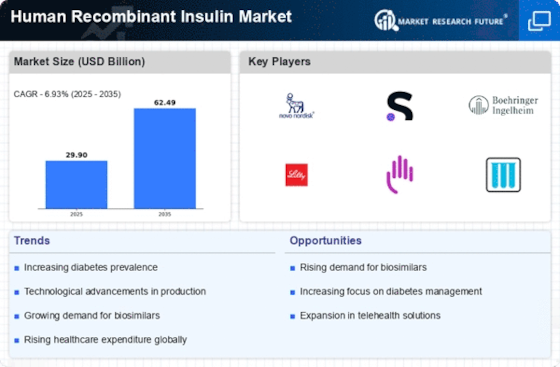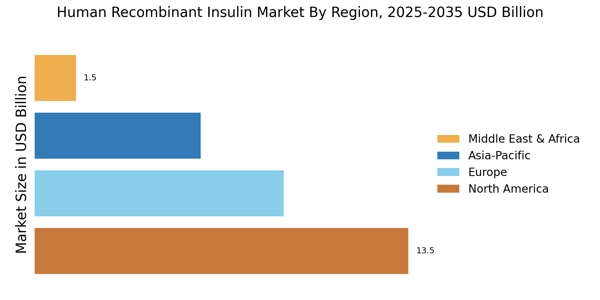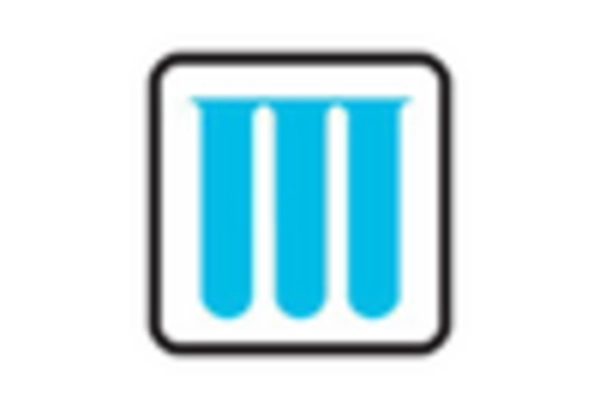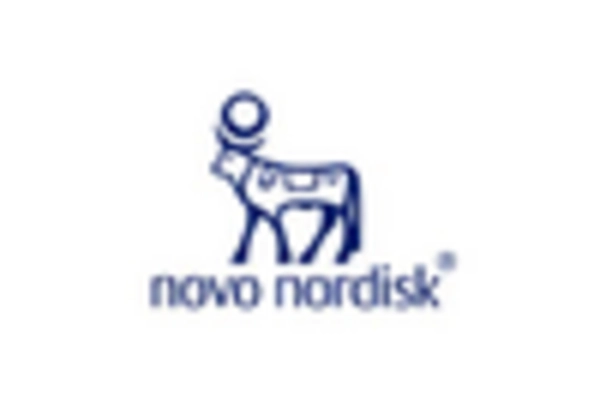Advancements in Biotechnology
Technological innovations in biotechnology are significantly influencing the Human Recombinant Insulin Market. The development of advanced recombinant DNA technology has enabled the production of insulin that closely mimics natural human insulin, enhancing its effectiveness. This has led to a surge in the availability of various insulin formulations, catering to diverse patient needs. The market for human recombinant insulin is expected to expand as these biotechnological advancements continue to evolve, potentially leading to more efficient production processes and cost reductions. Furthermore, the integration of automation and artificial intelligence in manufacturing could streamline operations, thereby increasing the overall output of the Human Recombinant Insulin Market.
Growing Demand for Insulin Pumps
The increasing adoption of insulin delivery systems, particularly insulin pumps, is driving the Human Recombinant Insulin Market. These devices offer patients a more convenient and effective means of managing their diabetes, allowing for continuous insulin delivery and better glycemic control. The market for insulin pumps is anticipated to grow at a compound annual growth rate of over 10% in the coming years, reflecting the rising preference for advanced diabetes management solutions. As more patients opt for these devices, the demand for human recombinant insulin, which is compatible with such systems, is likely to increase. This trend underscores the importance of innovation in the Human Recombinant Insulin Market, as manufacturers strive to meet the evolving needs of diabetes patients.
Increasing Prevalence of Diabetes
The rising incidence of diabetes worldwide is a primary driver for the Human Recombinant Insulin Market. According to recent estimates, the number of individuals diagnosed with diabetes is projected to reach approximately 700 million by 2045. This alarming trend necessitates the demand for effective insulin therapies, particularly recombinant insulin, which offers improved safety and efficacy profiles. As healthcare systems strive to manage this growing burden, the Human Recombinant Insulin Market is likely to experience substantial growth. The increasing awareness of diabetes management and the importance of insulin therapy further contribute to this trend, as patients seek reliable treatment options to maintain their health and quality of life.
Regulatory Support for Biosimilars
The regulatory landscape surrounding biosimilars is evolving, providing a favorable environment for the Human Recombinant Insulin Market. Regulatory agencies are increasingly recognizing the importance of biosimilars in enhancing patient access to essential medications, including insulin. This shift is expected to lead to a rise in the availability of biosimilar insulin products, which could potentially lower treatment costs and increase competition within the market. As healthcare providers and patients become more aware of the benefits of biosimilars, the Human Recombinant Insulin Market may witness a significant transformation, with an influx of new products that cater to diverse patient populations and preferences.
Focus on Diabetes Education and Awareness
The emphasis on diabetes education and awareness campaigns is a crucial driver for the Human Recombinant Insulin Market. As healthcare organizations and governments invest in initiatives to educate the public about diabetes management, the understanding of insulin therapy's role is likely to improve. Increased awareness can lead to higher rates of diagnosis and treatment adherence, ultimately driving demand for human recombinant insulin. Furthermore, educational programs that highlight the importance of regular monitoring and insulin administration may encourage patients to seek out effective treatment options. This growing focus on education is expected to positively impact the Human Recombinant Insulin Market, fostering a more informed patient population that actively engages in their diabetes management.

















